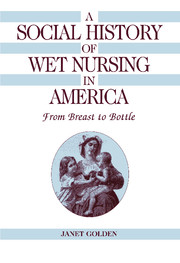Book contents
- Frontmatter
- Contents
- List of tables
- Acknowledgments
- List of abbreviations
- Introduction
- 1 Public discourse and private relations: Wet nursing in colonial America
- 2 The new motherhood and the new view of wet nurses, 1780–1865
- 3 Finding “just the right kind of woman”: The urban wet nurse marketplace, 1830–1900
- 4 “Victims of distressing circumstances”: The wet nurse labor force and the offspring of wet nurses, 1860–1910
- 5 Medical oversight and medical dilemmas: The physician and the wet nurse, 1870–1910
- 6 “Obliged to have wet nurses”: Relations in the private household, 1870–1925
- 7 “Therapeutic merchandise”: Human milk in the twentieth century
- Epilogue: From commodity to gift
- Index
- Cambridge History of Medicine
3 - Finding “just the right kind of woman”: The urban wet nurse marketplace, 1830–1900
Published online by Cambridge University Press: 06 July 2010
- Frontmatter
- Contents
- List of tables
- Acknowledgments
- List of abbreviations
- Introduction
- 1 Public discourse and private relations: Wet nursing in colonial America
- 2 The new motherhood and the new view of wet nurses, 1780–1865
- 3 Finding “just the right kind of woman”: The urban wet nurse marketplace, 1830–1900
- 4 “Victims of distressing circumstances”: The wet nurse labor force and the offspring of wet nurses, 1860–1910
- 5 Medical oversight and medical dilemmas: The physician and the wet nurse, 1870–1910
- 6 “Obliged to have wet nurses”: Relations in the private household, 1870–1925
- 7 “Therapeutic merchandise”: Human milk in the twentieth century
- Epilogue: From commodity to gift
- Index
- Cambridge History of Medicine
Summary
In 1881, physician Jerome Walker published a novel entitled The First Baby: His Trials and the Trials of His Parents, an account of one family's experiences in rearing a young infant. The book, an extended didactic discussion of a popular subject, was thinly disguised as fiction so that it could compete in a market crammed with advice literature. In one segment, the hero, Robert Matthews, accompanied by the faithful family physician, Dr. Lyons, undertakes an extensive journey in search of a wet nurse. The trip is only moderately successful, leading Lyons to lament the absence of a “systematic effort to furnish the persons most needing wet nurses with just the right kind of woman.”
Walker's novel accurately delineates the complexity of the urban wet nurse marketplace, in which public facilities, private entrepreneurs, and benevolent organizations vied to supply families with wet nurses. At the core of the expanding layers of wet nurse suppliers was a wet nurse labor force increasingly composed of poor, single mothers. These were not the “right kind of women” referred to by Dr. Lyons. However, as the novel's characters and real-life families recognized, the wet nurse population was shaped not by the demands of employers and the preferences of physicians, but by the conditions of life and labor for urban, working-class women.
The evolution of the marketplace between 1830 and 1900 reflected three separate, simultaneous trends, beginning with the commercialization of domestic service.
- Type
- Chapter
- Information
- A Social History of Wet Nursing in AmericaFrom Breast to Bottle, pp. 64 - 96Publisher: Cambridge University PressPrint publication year: 1996



